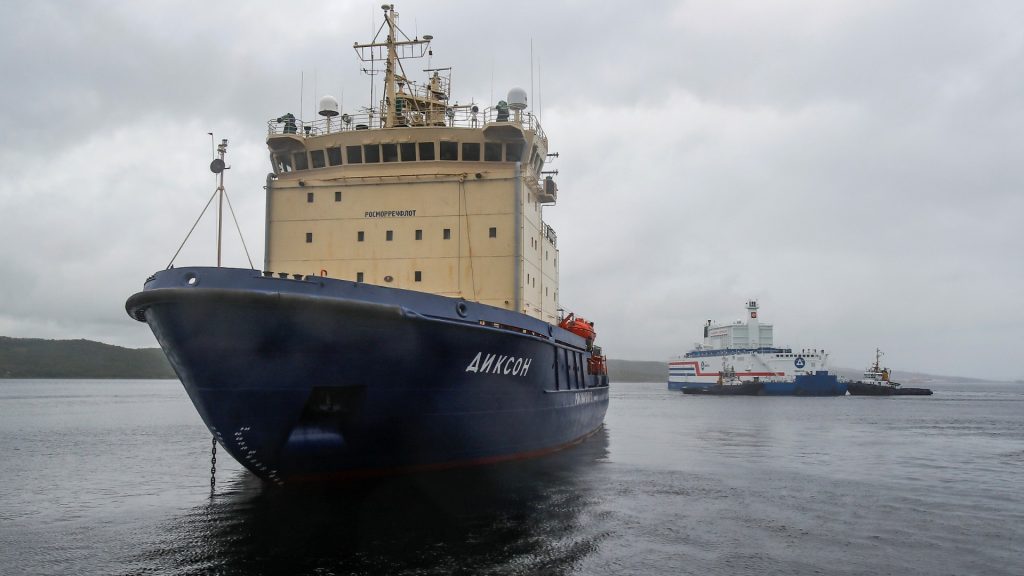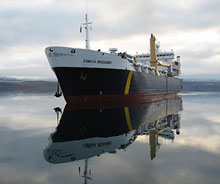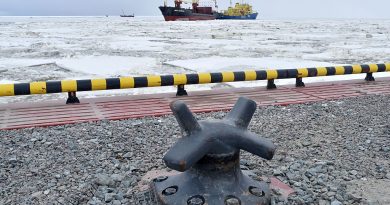Russia’s Rosatomflot files lawsuits against shipyard as world’s most powerful icebreakers are notoriously delayed

Few details on the content of the lawsuits are made public, but Rosatomflot, the federal enterprise operating and maintaining the fleet of nuclear powered icebreakers, is surely not happy about the endless list of delays and technical faults during construction of the three first giant ships of the Project 22220.
The new Arktika, lead vessel of the class, was supposed to sail out from the Baltic Shipyard in St. Petersburg to er waiting home base in Murmansk in 2017. The first delay was caused by problems with delivering the main turbines to the ship’s engines because of the Russia-Ukraine conflict. The turbines were made at the Kharkov Turbine plant in Ukraine.
New delays came this year as a February test-sailing outside St. Petersburg resulted in a short circuit causing serious damage to the winding in one of the three electro engines on board. The entire engine has to be lifted out of the hull and replaced. Arktika was promised to sail north in June, but she is still in St. Petersburg. New date for the maiden voyage into the ice along the Northern Sea Route is October, the news site 47 News recently reported.
The portal Atomnaya Energiya can tell about three lawsuits filed by Rosatomflot; one asks for 139 million ruble, the second 94 million rubles, while the third claim amounts to 733 million rubles. In total nearly a billion ruble (€11,5 million).
The first part of the juridical battle started in St. Petersburg last week, as the builder of the icebreakers, Baltic Shipyard, filed a claim against Kirovsky Zavod (factory) and its two daugther companies, Zavod Kirov Energomash and Petersburg Tractor Plant. The two are suppliers to the construction of the icebreakers.
Then, the Baltic Shipyard itself has to meet in the Moscow Arbitration Court on request of Rosatomflot. Baltic Shipyard is part of the United Shipbuilding Corporation, Russia’s state owned and largest company building everything from navy surface ships, nuclear-powered submarines, icebreakers, tankers and fishing trawlers.
Rosatomflot is also a 100% state owned company.
Possible delays for the whole fleet
Arktika was laid down in 2013, but also the two following icebreakers of the Project 22220, laid down in 2015 and 2016 seem to face delays.
The Sibir was launched in 2017 and is still officially scheduled to be put into service in 2021. The ship, though, was only 70 percent ready this May, PortNews reported raising doubts it will be completed by next summer.
The third icebreaker, the Ural was launched in May 2019 with a promise to be handed over to Rosatomflot in 2022. Also that is in doubt, the 47 News reported with reference to Baltisky Shipyard’s General Director, Aleksey Kadilov. No new date was specified.
Construction of the fourth icebreakers of the Project 22220, the Yakutia, started this spring, while the firth, to be named Chukotka is planned to be laid down in 2021.
Related stories from around the North
Canada: Canadian navy receives its first new Arctic and offshore patrol ship, Radio Canada International
Denmark: Pompeo to talk Arctic at upcoming meeting with Danish Foreign Minister, Eye on the Arctic
Finland: Finland joins other Nordic countries in virtual tourism due to pandemic, Yle News
Iceland: Nordics should aim for common approach to China’s Arctic involvement says report, Eye on the Arctic
Norway: Norway strengthens its Arctic military in new defense plan as security concerns grow in the region, The Independent Barents Observer
Russia: Two Chinese rigs prepare for drilling in Russian Arctic waters, The Independent Barents Observer
Sweden: Sweden’s FM calls for more EU involvement in Arctic as country hosts EU Arctic Forum, Radio Sweden
United States: Trump advances new icebreaker plan, Alaska Public Media



